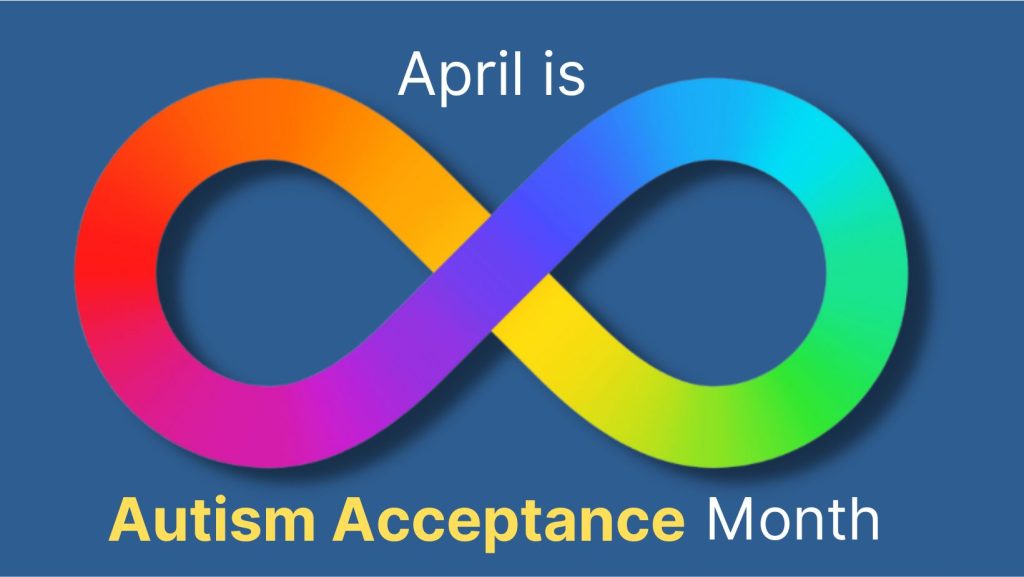
Autism Acceptance Month, previously named Autism Awareness Month, is celebrated in April.
“This Month, autism rights groups are asking schools and the media to focus on the inclusion and acceptance of those with different neurologies. This starts with the small, but significant, change from Autism Awareness to Autism Acceptance.”1
What is Autism?
“Autism spectrum disorder (ASD) is a developmental disability caused by differences in the brain. Some people with ASD have a known difference, such as a genetic condition. Other causes are not yet known. Scientists believe there are multiple causes of ASD that act together to change the most common ways people develop. We still have much to learn about these causes and how they impact people with ASD.”2

What are the common signs of Autism?
“People with ASD often have problems with social communication and interaction, and restricted or repetitive behaviors or interests. People with ASD may also have different ways of learning, moving, or paying “attention. It is important to note that some people without ASD might also have some of these symptoms. But for people with ASD, these characteristics can make life very challenging.”3

How do Doctors Diagnose Autism?
“Although ASD can be diagnosed as early as 15 to 18 months of age, the average age of diagnosis is about 4.5 years, and some people are not diagnosed until adulthood. That’s unfortunate, as prompt diagnosis is important for early intervention. Research has shown that intensive early intervention can make a big difference in the outcomes for people with ASD. If you suspect your child shows signs of the disorder, don’t put off testing.”4

Can adults have autism?
“Many adults can and do have autism spectrum disorder. But it’s only recently that doctors have begun diagnosing them with it.
That’s in part because autism is still a fairly recent addition to The Diagnostic and Statistical Manual of Mental Disorders (DSM), the gold standard for classifying mental disorders in the U.S. When autism was first added to the DSM in 1980, it was only classified as a disorder that affected children.”5

Main signs of autism in adults
“Common signs of autism in adults include:
- finding it hard to understand what others are thinking or feeling getting very anxious about social situations
- finding it hard to make friends or preferring to be on your own seeming blunt, rude or not interested in others without meaning to finding it hard to say how you feel.
- taking things very literally – for example, you may not understand sarcasm or phrases like “break a leg”
- having the same routine every day and getting very anxious if it changes.”6

Support for adults with autism
Adults aren’t generally given the same support as children with ASD. Sometimes adults with ASD may be treated with cognitive, verbal, and applied behavioral therapy.
In general, you’ll want to seek out specific support based on the impacts you’re experiencing. This might include anxiety, social isolation, relationship problems, or job difficulties.
Some possibilities include: Psychiatrist or psychologist, Medication, Social worker, Therapy, Vocational rehabilitation, Support groups.”7

To learn more about understanding autism and recognizing its signs:
- “Many services, programs, and other resources are available to help people with ASD. Here are some tips for finding these additional services:
- Contact your health care provider, local health department, school, or autism advocacy group to learn about special programs or local resources.
- Find an autism support group. Sharing information and experiences can help people with ASD and their caregivers learn about treatment options and ASD-related programs.
- Record conversations and meetings with health care providers and teachers. This information may help when it’s time to decide which programs and services are appropriate.
- Keep copies of health care reports and evaluations. This information may help people with ASD qualify for special programs.”8

Resources:
[1] https://www.weareteachers.com/autism-acceptance-not-awareness/
[2] https://www.cdc.gov/ncbddd/autism/facts.html
[3] https://www.cdc.gov/ncbddd/autism/signs.html
[4] https://www.apa.org/topics/autism-spectrum-disorder/diagnosing
[5] Can Adults Be Diagnosed With Autism? – Cleveland Clinic
[6] https://www.nhs.uk/conditions/autism/signs/adults/
[7] https://www.healthline.com/health/autism-in-adults#summary
[8] https://www.nimh.nih.gov/health/topics/autism-spectrum-disorders-asd
